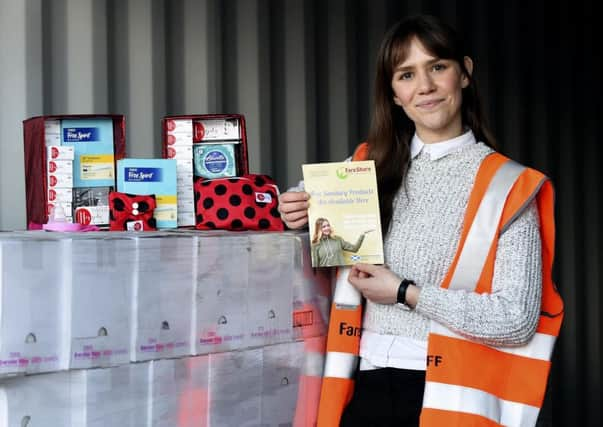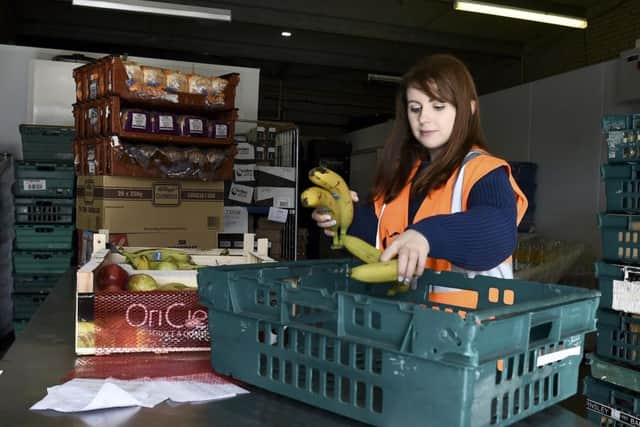Leith group attempts to stamp out period poverty


Coined “period poverty”, one in ten girls, according to Plan International UK, can’t afford to buy menstrual products.
Costing more than £18,000 in a women’s life – £13 every month – it is often alternatives to tampons and pads that are used when households and individuals are faced with poverty.
Advertisement
Hide AdAdvertisement
Hide AdAnd now, following Scottish Government funding, a social enterprise based in Leith is helping stamp out the shame and stigma that comes with period poverty.


A shipping container sits next to the giant warehouse in Jane Street, which is stuffed from floor to ceiling with shelves of food.
Fridge units are packed with pallets of fresh fruit, the freezer with chicken and until recently, hundreds of haggis as well as tinned lentils, jars of beetroot and crate-loads of cereal in every crevice of the depot.
The Good Food warehouse is the biggest food redistribution centre in Edinburgh. Meaning every day, thousands of products are dropped off by supermarkets and food outlets and a committed team of volunteers and employees, unload, organise and prepare the food to be sent back out to charities and organisations throughout the city.
Advertisement
Hide AdAdvertisement
Hide AdIt is an astonishing sight to witness the scale of potential food waste that, without the thorough organisation, expansive networks and dedication of the Cyrenians FareShare team, would simply be given to the dogs, or worse, thrown away.
Often simply mislabelled (Noddle soup got ditched before it reached the shelves, much to the benefit of Good Food), the food is in perfect condition and within date – simply not suitable for the consumer market.
And now outside, utilising the established links with charities, a substantial shipping crate is stuffed full of boxes of sanitary pads and tampons as well as menstrual cups and reusable pads.
Rachel Vette, who is enthusiastically leading the access to sanitary products project for FareShare Central & South East Scotland said following a pilot project in Aberdeen, they had become more aware of the scope of the issue.
Advertisement
Hide AdAdvertisement
Hide Ad“What we found is, if someone is struggling to afford food, they are likely going to be living in period poverty as well.
“If you can’t afford food then everything else is secondary and sanitary products is one of those things individuals may not be able to afford and end up having to go without.”
There are four co-ordinators in similar depots across Scotland – Aberdeen, Dundee, Glasgow – and Rachel, who distributes from Stirling to the Scottish Borders providing products to 175 organisations who then distribute to those in need of them. A total of £4 million of funding from the Scottish Government was dished out to support the issue, with local authorities also receiving cash. But in comparison to councils, who are mostly providing students and pupils with free access in schools, colleges and universities, FareShare is enabling any and all low income and/or vulnerable women to access sanitary products – all via their network of charities and community groups in the area.
And it is Cyrenians, which runs the Leith depot with FareShare, and its army of volunteers who ensure the sanitary products and food get to the people who need it most.
Advertisement
Hide AdAdvertisement
Hide AdCyrenians service manager Lynne Collie said: “We are proud to be able to help provide these sanitary products to those who need them as part of our wider work with FareShare where we distribute over 35 tonnes of surplus food per month. No-one should suffer the social stigma and isolation of being unable to afford basic sanitary provisions.
“Although we’re still in the initial pilot phase of this scheme we have exceeded our initial targets, highlighting the essential need of the service and the impact this kind of support will have.”
FareShare believes the impact of period poverty can be significant. A spokesperson said: “Women shouldn’t have to make a choice between feeding their family and buying themselves sanitary protection. They shouldn’t have to stay at home during their period because they are frightened to go out in case they don’t have the necessary products to hand and are left embarrassed. We want to make sanitary products as easily accessible as possible and we want to end the embarrassment many women face if they have to ask for products.”
Although stamping out period poverty is, as Rachel described it, a very ambitious aim, they are looking into reusable sanitary products which have the double benefit of being sustainable but are also less expensive for individuals, as they can be used long term, removing the stigma of continually returning for replenishments. As well as Boots and Tesco, FareShare and Cyrenians are working with Dunbar business Hey Girls, which specialises in sustainable sanitary products.
Advertisement
Hide AdAdvertisement
Hide AdCelia Hodson of Hey Girls said: “We have been suppling FareShare with plastic-free period products for over six months. We are thrilled that by working closely together we now reach such a wide section of the population with ‘Buy One Give One’ organic tampons, biodegradable sani pads, plant-based sugar cane applicator tampons, reusable pads, and menstrual cups.
“Working with Fareshare has also enabled us to deliver My Period workshops that turn the dial on the period conversations and menstrual taboos.”